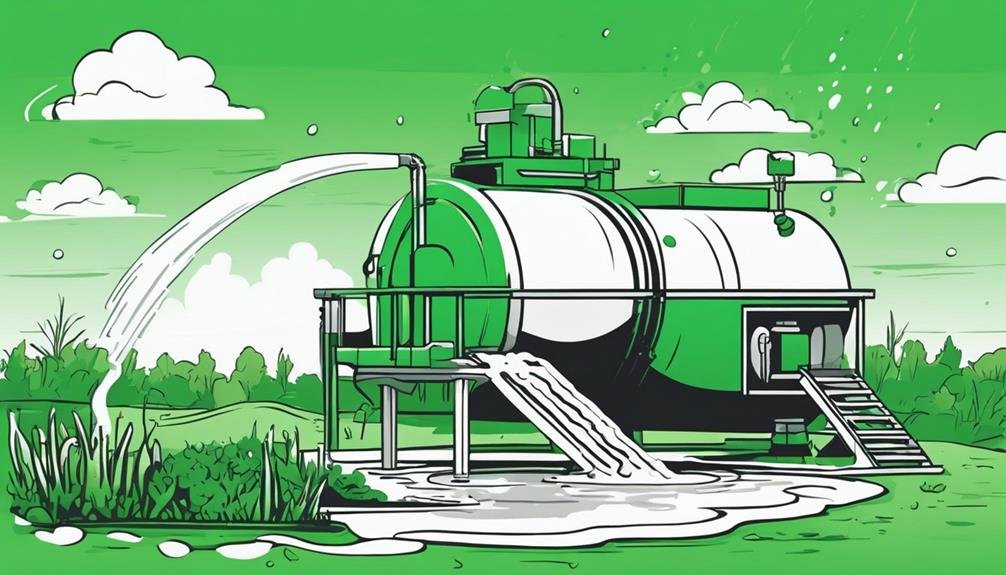Did you know that septic tank odor can not only be unpleasant but may also indicate a potential issue with your system?
With the right solutions, you can tackle this problem effectively and maintain a fresh-smelling environment around your home.
From simple tips you can implement yourself to more specialized treatments, exploring the 10 best ways to eliminate septic tank odor will ensure a healthier and more comfortable living space for you and your family.
Key Takeaways
- Regular maintenance through pumping every 3-5 years reduces foul-smelling gases.
- Timely leak inspection and repair prevent odors and system damage.
- Utilize septic tank additives to break down waste and eliminate odors effectively.
- Improve ventilation to allow gases to escape and combat septic tank odor.
Regular Pumping Schedule

To maintain a septic tank system free of odors, it's crucial to adhere to a regular pumping schedule every 3-5 years. Odor control is directly linked to the frequency at which the tank is pumped. Over time, solid waste accumulates in the tank, leading to the production of foul-smelling gases. By pumping the tank every 3-5 years, you ensure that these gases are minimized, thus preventing unpleasant odors from permeating your property.
Regular pumping not only aids in odor control but also plays a significant role in maintaining the overall health of your septic system. When the tank is pumped on schedule, it prevents solids from building up to levels where they could potentially clog the system or leach into the drain field, causing costly damage.
Inspect and Repair Leaks
Inspecting and repairing leaks in your septic tank system is essential for preventing foul odors and maintaining its optimal functionality. Leak detection should be a priority to address any issues promptly.
Common signs of leaks include soggy areas around the tank, foul smells lingering near the drain field, or unusually lush grass above the septic system. To pinpoint the exact location of leaks, professionals may use dye tests, video inspections, or pressure tests.
Once the leaks are identified, prompt action is crucial to prevent further damage. Repair solutions vary depending on the severity of the leak but may include patching small cracks, replacing damaged pipes, or installing a new sealant. It's important to consult with a licensed septic system professional to ensure that the repairs are done correctly.
Neglecting leak repairs can lead to more significant issues, such as groundwater contamination or system failure, so addressing leaks promptly is vital for the longevity of your septic tank system.
Use Septic Tank Additives

When it comes to tackling septic tank odor, using septic tank additives can be a game-changer.
Understanding the different types of additives available and how frequently they should be applied can significantly impact the effectiveness of odor control.
Types of Additives
Consider incorporating specially formulated septic tank additives to help maintain a balanced microbial environment and reduce unpleasant odors in your septic system. These additives can be highly effective in controlling odors and promoting the proper breakdown of waste within your tank. When selecting additives, look for those specifically designed for odor control and microbial balance.
Here are key types of additives to consider:
- Enzyme-Based Additives: These additives work by breaking down organic matter, helping to reduce odors and prevent clogs.
- Bacteria-Based Additives: Introducing beneficial bacteria can aid in waste decomposition and odor elimination.
- Chemical Additives: Some chemical additives can target specific odor-causing compounds, providing quick odor relief.
- Oxygen-Releasing Additives: These additives help create an aerobic environment, which can enhance microbial activity and reduce odors.
Application Frequency
To maintain optimal septic system performance and effectively control odors, determining the appropriate application frequency for septic tank additives is crucial. When it comes to odor control and frequency maintenance, using additives regularly can make a significant difference.
Typically, it's recommended to apply septic tank additives every month to ensure a consistent level of beneficial bacteria that aids in breaking down waste and reducing odors. However, the specific frequency may vary depending on the product used and the condition of your septic system. Be sure to follow the manufacturer's instructions for the best results.
Increase Ventilation
Improving the airflow in your septic system can effectively reduce and eliminate the unpleasant odor emanating from the tank. Here are some practical ways to increase ventilation and combat septic tank odor:
- Install a Vent Pipe: Ensure your septic system has a vent pipe that extends above your roofline. This pipe allows gases to escape, reducing odor buildup.
- Clear Vent Blockages: Regularly inspect and clear any blockages in the vent pipe to maintain proper airflow and prevent odors from lingering.
- Use Natural Ventilation: Take advantage of natural wind currents by strategically placing windows, doors, or vents to encourage airflow around your septic system.
- Consider Mechanical Ventilation: If natural ventilation is insufficient, installing a mechanical vent fan can help enhance airflow and eliminate odors more effectively.
Avoid Harsh Chemicals

To maintain a fresh-smelling septic system, prioritize using gentle, non-toxic alternatives and steer clear of harsh chemicals that can disrupt the delicate balance of your tank's environment. Harsh chemicals like bleach, strong detergents, and chemical drain cleaners can kill the beneficial bacteria in your septic tank, leading to odor issues and potential system failures. Instead, opt for natural remedies and DIY solutions that are safe for both your septic system and the environment.
Natural remedies like using baking soda and vinegar can help break down organic matter and eliminate odors without harming the beneficial bacteria in your septic tank. Additionally, regular maintenance with bacterial additives specifically designed for septic systems can aid in keeping your tank odor-free. DIY solutions such as making sure to not flush harmful chemicals like paint, medications, or excessive cleaning products down the drain can also contribute to a healthier septic system. By avoiding harsh chemicals and embracing natural and DIY alternatives, you can ensure a fresh-smelling septic system without compromising its functionality.
Install a Filter
Consider installing a filter to effectively trap debris and prevent clogs in your septic system, ensuring smooth operation and reducing the risk of foul odors.
Here are some key points to keep in mind when installing and maintaining a filter in your septic system:
- Choose the Right Filter: Select a filter designed specifically for septic systems to ensure optimal performance.
- Regular Maintenance: Schedule routine filter maintenance to prevent buildup and ensure proper filtration.
- Monitor Filter Efficiency: Keep an eye on the filter to ensure it's functioning correctly and not causing any blockages.
- Explore Odor Control Techniques: In addition to filtering, consider using odor control additives or natural remedies to further reduce unpleasant smells.
Maintain Drain Field

To maintain your drain field effectively, focus on soil aeration by preventing heavy vehicles from driving over it and compacting the soil.
Another important step is to plant grasses in the area to help absorb excess moisture and prevent standing water that can lead to odor issues.
Regularly inspecting the drain field for any signs of problems, such as soggy patches or foul smells, can help you address issues promptly and prevent them from escalating.
Soil Aeration
Improving soil aeration is crucial for maintaining the drain field and preventing septic tank odor issues. Proper soil aeration benefits the overall health of your septic system by promoting the growth of beneficial bacteria that break down waste efficiently.
Here are some aeration techniques to help you keep your drain field in optimal condition:
- Core Aeration: This method involves removing small cores of soil to reduce compaction and allow air to reach the drain field.
- Mechanical Aeration: The use of specialized equipment to perforate the soil and enhance air circulation.
- Natural Aeration: Planting deep-rooted vegetation helps in naturally aerating the soil.
- Avoid Soil Compaction: Be mindful of heavy machinery or vehicles that can compact the soil, hindering aeration.
Plant Grasses
Planting grasses is essential for maintaining the health and functionality of your drain field. When it comes to landscaping options for your drain field, grasses play a crucial role in absorbing excess moisture and preventing soil erosion.
Opt for grass varieties that have shallow root systems to avoid interference with the drain field pipes. These grasses not only help in the natural aeration of the soil but also act as natural deodorizers by absorbing excess moisture that can lead to foul odors.
Regularly mowing the grass to the recommended height will ensure optimal performance. By incorporating grasses into your drain field maintenance routine, you're promoting a healthier septic system while enjoying a visually appealing landscape.
Consider Aerobic Treatment
Consider incorporating an aerobic treatment system to effectively address and eliminate septic tank odor issues. Aerobic treatment systems offer several advantages over traditional anaerobic systems, primarily due to their enhanced ability to break down waste efficiently. Here's why aerobic treatment is a promising solution for septic tank odor problems:
- Improved Odor Control: Aerobic treatment promotes better odor control by facilitating the breakdown of organic matter more effectively.
- Enhanced Waste Decomposition: The increased oxygen levels in aerobic systems support the growth of aerobic bacteria, which break down waste more rapidly.
- Reduced Maintenance Needs: Aerobic systems typically require less maintenance compared to anaerobic systems, making them a convenient choice for homeowners.
- Environmentally Friendly: Aerobic treatment is more environmentally friendly as it produces cleaner effluent that can be safely reintroduced into the environment.
Utilize Baking Soda and Vinegar

To effectively combat septic tank odor, consider utilizing a mixture of baking soda and vinegar for a natural and environmentally friendly solution. This DIY approach offers an inexpensive and easy way to tackle unpleasant smells emanating from your septic system. Baking soda, a known odor absorber, helps neutralize acidic odors, while vinegar's acidic nature aids in breaking down organic matter that may cause foul smells.
To apply this method, start by pouring about a cup of baking soda down the drains connected to your septic system. Follow this with a cup of vinegar to create a foaming reaction that helps clean the pipes. Let this mixture sit for about 30 minutes before flushing with hot water. Repeat this process monthly as a preventative measure against future odors.
These natural remedies not only combat odor effectively but also contribute to maintaining a healthy septic system. By incorporating baking soda and vinegar into your regular maintenance routine, you can enjoy a fresher-smelling home without harsh chemicals.
Professional Odor Treatment
For effectively addressing persistent septic tank odors, professional odor treatment services provide targeted solutions to eliminate unpleasant smells at the source. These services offer specialized techniques and expertise to tackle even the most stubborn odors, ensuring a fresh-smelling environment in your home. Here are some key benefits of utilizing professional services for septic tank odor control:
- Customized Solutions: Professionals assess the specific odor issues in your septic system and tailor their treatment methods to suit your unique needs, ensuring effective results.
- Advanced Technologies: Professional odor treatment services utilize state-of-the-art equipment and innovative technologies to combat odors efficiently and thoroughly.
- Long-Term Odor Prevention: By addressing the root cause of the odor problem, professional services help prevent future issues, providing lasting odor control solutions.
- Expert Guidance: Professionals offer valuable insights and recommendations on septic system maintenance practices to help you keep odors at bay and maintain a fresh-smelling environment in the long run.
Conclusion
In conclusion, maintaining a regular pumping schedule, inspecting for leaks, and using septic tank additives are key to eliminating septic tank odors.
Remember, 'An ounce of prevention is worth a pound of cure.' By following these solutions and taking proactive measures, you can ensure your septic system remains odor-free and functioning properly.
Don't wait until the smell becomes unbearable, take action now to keep your septic tank in top condition.

